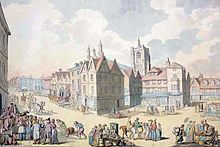| This article relies largely or entirely on a single source. Relevant discussion may be found on the talk page. Please help improve this article by introducing citations to additional sources. Find sources: "Peter Gleane" MP for Norwich – news · newspapers · books · scholar · JSTOR (January 2023) |
Sir Peter Gleane (1564–1633) was an English politician who sat in the House of Commons from 1628 to 1629.

Gleane was the son of Thomas Gleane of Norwich and was baptised at St Peter Mancroft, Norwich, on 27 June 1564. He was awarded BA from Clare College, Cambridge in 1583. In 1610, he was Sheriff of Norwich and, in 1615, the Mayor of Norwich. He was knighted on 13 June 1624.
In 1628, he was elected Member of Parliament for Norwich and sat until 1629 when King Charles decided to rule without parliament for eleven years.
Gleane died at the age of about 69 and was buried at St Peter Mancroft on 10 May 1633.
Gleane married Maud Suckling, daughter of Robert Suckling of Norwich. His grandson Peter was created a baronet.
See also
References
- ^ "Gleane, Peter (GLN582P)". A Cambridge Alumni Database. University of Cambridge.
| This article relies largely or entirely on a single source. Relevant discussion may be found on the talk page. Please help improve this article by introducing citations to additional sources. Find sources: "Peter Gleane" MP for Norwich – news · newspapers · books · scholar · JSTOR (April 2014) |
| Parliament of England | ||
|---|---|---|
| Preceded bySir John Suckling Sir Thomas Hyrne |
Member of Parliament for Norwich 1628–1629 With: Robert Debney |
Parliament suspended until 1640 |
This article about a 17th-century Member of the Parliament of England (up to 1707) is a stub. You can help Misplaced Pages by expanding it. |